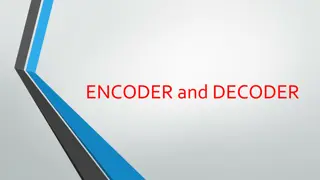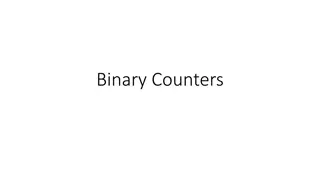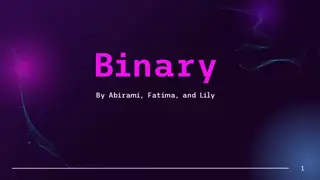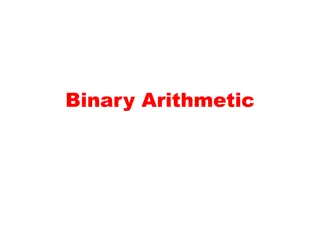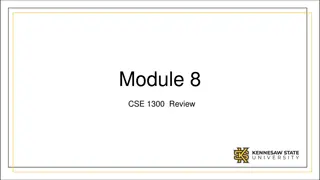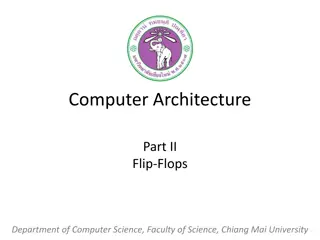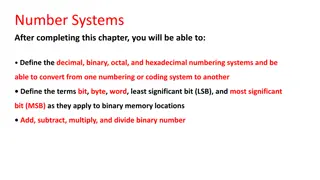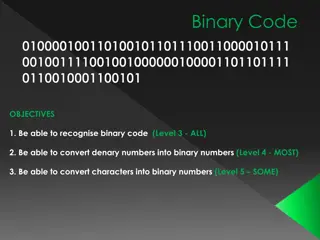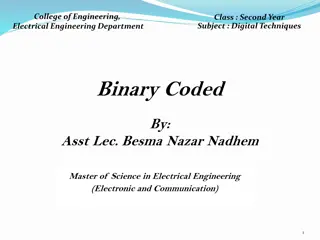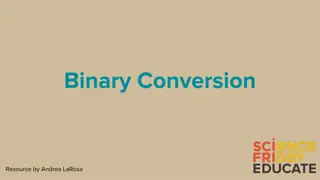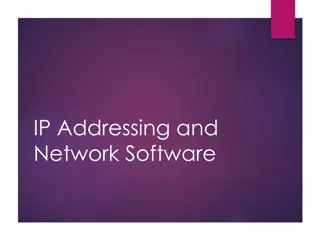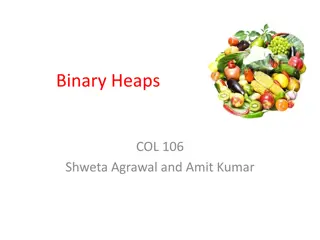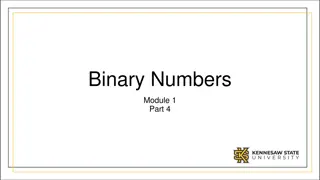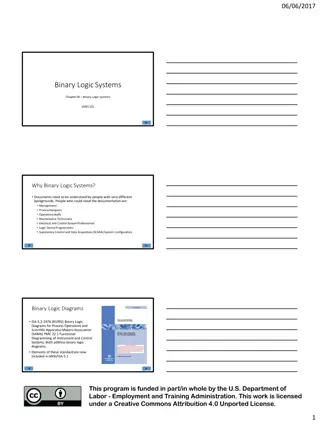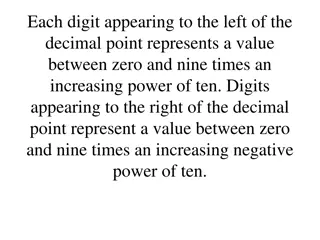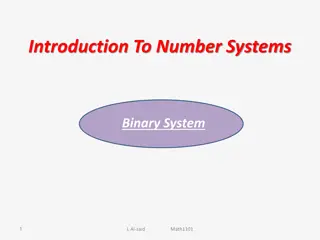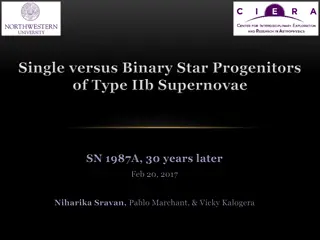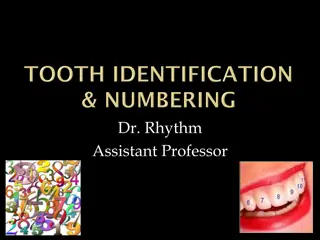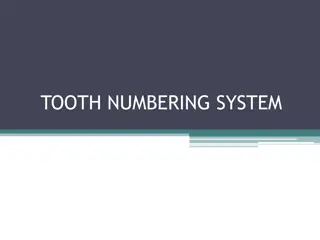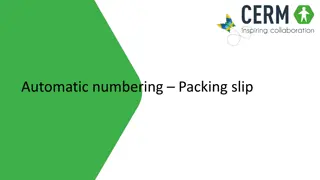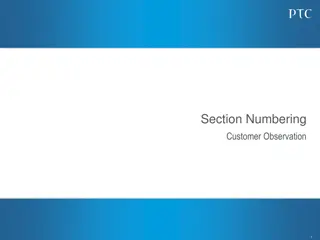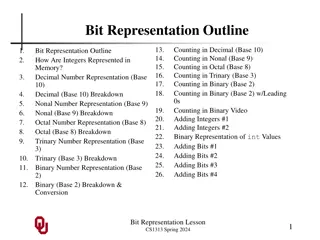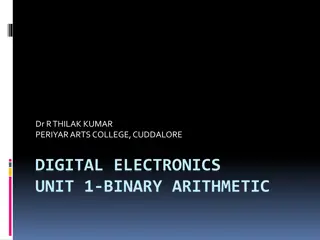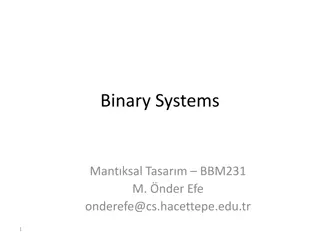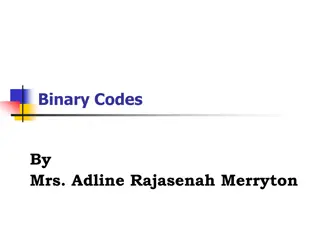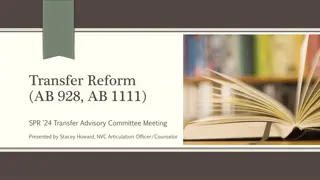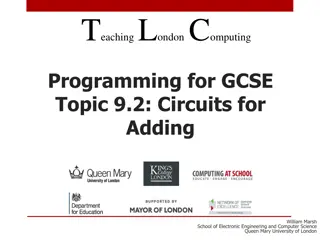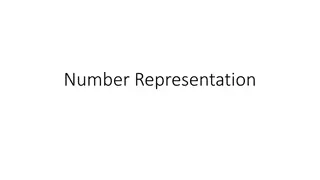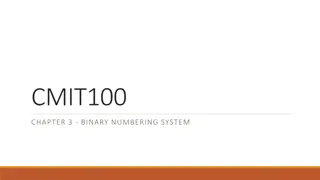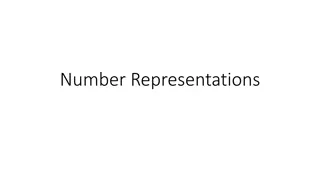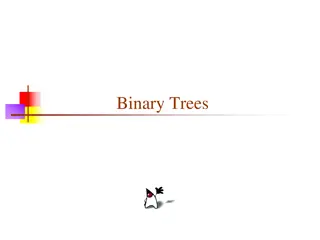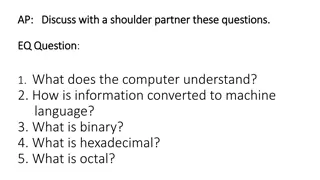Understanding Binary Codes and Their Applications
Binary coding is crucial for digital systems as they understand only 0s and 1s. This process converts information into binary language for processing by digital circuits. Different types of binary codes like weighted codes and BCD codes are used for error correction, digital communication, and compu
7 views • 20 slides
Understanding Encoder and Decoder in Combinational Logic Circuits
In the world of digital systems, encoders and decoders play a crucial role in converting incoming information into appropriate binary forms for processing and output. Encoders transform data into binary codes suitable for display, while decoders ensure that binary data is correctly interpreted and u
4 views • 18 slides
Understanding Binary Counters and Types of Counters
Binary counters are registers used to count clock pulses, while binary counters follow the binary number sequence. There are two types of counters: serial/asynchronous counters and parallel/synchronous counters. Serial counters change output flip-flop to next flip-flop, requiring minimal hardware bu
12 views • 21 slides
Understanding Non-Weighted Codes and Excess-3 Code in Binary Systems
Explore non-weighted binary codes like Excess-3 code, learn how to convert decimal numbers to XS-3 code, advantages and disadvantages of BCD codes, and steps to convert Excess-3 code to binary. Discover the intricacies of binary coding systems with practical examples.
5 views • 55 slides
CEPT Workshop on 6G Mobile Communications: Numbering & Network Issues
CEPT Workshop on 6G Mobile Communications, led by Elizabeth Greenberg of Ofcom UK, addresses the role of numbering and networks in the ECC, numbering considerations for 6G, and how WG NaN contributes to the development of numbering for 6G technologies. Key topics include ensuring non-discriminatory
1 views • 8 slides
Sequential Label Price Labels Manufacturer In Kolkata India
Sequential numbering labels and related machines are utilized by large garment exporters so as to mark the numbers on the fabric in order to avoid confusion regarding color variation down the stitching line. Hence, we have established our self to deliver labels for different fabrics and varieties wi
1 views • 3 slides
Understanding Binary Number System and its Applications
Explore the world of binary numbers with insights on what binary is, its significance in computing, conversion methods between binary and decimal, hexadecimal number system, and binary arithmetic operations. Dive into the foundations of digital communication through the language of zeros and ones.
0 views • 24 slides
Binary Arithmetic
Explore the world of binary arithmetic, including addition, subtraction, multiplication, and division. Learn the rules and examples of performing basic binary operations efficiently. Understand how to convert binary numbers to decimal equivalents. Enhance your understanding with visual explanations
0 views • 51 slides
Understanding Computer Components and Binary Numbers in Computing
Computer components like the case, power supply unit, motherboard, and storage devices play crucial roles in a computer system. CPUs consist of essential parts like the ALU, control unit, and registers. Binary numbers, a base-2 numbering system, simplify data representation and processing in computi
1 views • 44 slides
Understanding Combinational Circuits in Computer Architecture
Combinational circuits in computer architecture play a crucial role in transforming binary information from input data to output data. These circuits consist of logic gates connected in a specific arrangement to process binary data efficiently. Key components such as half-adders and full-adders are
1 views • 48 slides
Understanding Number Systems in Digital Computing
Explore the decimal, binary, octal, and hexadecimal numbering systems essential for digital computing. Learn to convert between these systems, grasp terms like bit, byte, and word, and perform basic binary arithmetic operations. Visual aids and explanations make complex concepts easily understandabl
0 views • 24 slides
Understanding Binary Code and its Conversion
Computers rely on binary code, consisting of 0s and 1s, to communicate. Learn how to recognize, convert denary numbers to binary, and understand the basics of the computer language. Discover how to create a table for conversion and practice converting numbers to binary in this informative guide.
1 views • 26 slides
Binary Basic Block Similarity Metric Method in Cross-Instruction Set Architecture
The similarity metric method for binary basic blocks is crucial in various applications like malware classification, vulnerability detection, and authorship analysis. This method involves two steps: sub-ldr operations and similarity score calculation. Different methods, both manual and automatic, ha
0 views • 20 slides
Understanding Binary Codes and Self-Complementing Codes
The concept of binary codes, including Binary Coded Decimal (BCD) codes, and self-complementing codes is explored in this informative content. Learn about how decimal numbers are represented in binary form, the structure of BCD codes, and the properties of self-complementing codes like 2421 and Exce
2 views • 34 slides
Understanding Binary Coded Decimal (BCD) and Excess-3 Code
Binary Coded Decimal (BCD) is a binary code used to represent decimal numbers, with the popular 8421 BCD code and its conversion process explained. Additionally, Excess-3 Code, another BCD code, is detailed with an example of finding its code for a given decimal number. Different BCD codes like 4221
0 views • 11 slides
Understanding Binary Code and Color Conversion
Delve into the fascinating world of binary code and learn how it works to represent data digitally. Discover the process of decoding binary pulses into colored pixels, using binary sequences to identify colors, and practicing digital-analog conversion through logic maps. Explore the language of bina
0 views • 20 slides
Recover Lost Funds From Binary Options Fraud Brokers
Are you a victim of a binary options fraud? You can fight back and recover your funds. Report to MychargeBack today! We have helped thousand of binary options fraud victims to get their money back. You can get your funds back from binary options scam
0 views • 15 slides
Understanding IP Addressing and Conversion from Binary to Decimal
Learn about IP addressing, including binary notation, dotted-decimal notation, and the process of converting binary numbers to decimal. Explore the unique features of IP addresses and the steps involved in converting binary to decimal systematically.
4 views • 47 slides
Understanding Binary Heaps: Efficient Data Structure for Priority Queue Operations
Explore the concept of binary heaps, a specialized type of binary tree that allows for quick retrieval of the smallest (or largest) element. Learn how binary heaps excel in finding the minimum value, essential for priority queue applications in operating systems, event simulations, and more. Compare
2 views • 34 slides
Understanding Binary and Decimal Number Systems
This content explores the basics of binary and decimal number systems in a simple and engaging manner. It starts with decimal numbers, explaining how our numbering system works and progresses to binary numbers, which have only 2 digits (0 and 1). The significance of these systems in computing and ho
0 views • 27 slides
Understanding Binary Logic Systems in Documentation
Binary logic systems play a crucial role in documentation for individuals with diverse backgrounds such as management, process designers, operations staff, maintenance technicians, and more. These systems, depicted in binary logic diagrams, provide a clear and concise representation for various prof
4 views • 16 slides
Understanding Hexadecimal Numbering System
Hexadecimal numbering system provides a compact and efficient way to represent numbers, especially in computing. It uses digits 0-9 and letters A-F to represent values from 0 to 15. Converting between decimal and hexadecimal is crucial in computing, and hexadecimal numbers are widely used in binary
0 views • 88 slides
Exploring the Binary Number System in Mathematics
Delve into the intricacies of the binary number system with this comprehensive guide. Learn how binary numbers are formed, and master the conversion techniques between binary and decimal numbers. Discover the fascinating world of binary fractions and the algorithms for converting decimal numbers to
0 views • 20 slides
Unveiling the Progenitors of Stripped Envelope Supernovae (SNe)
The mechanism behind the stripping of stripped-envelope SNe remains a key question linked to their progenitors. Various mechanisms such as Single Star Progenitors, Binary Star Progenitors, Stellar Winds, and Close Binary Interactions are thought to dominate the stripping process. Observations of Typ
0 views • 12 slides
Open MPI Project: Updated Version Numbering Scheme & Release Planning
Explore the transition from an odd/even version numbering scheme to an A.B.C version triple for Open MPI project, addressing issues with feature adoption and stability. This update aims to deliver new features efficiently and maintain backward compatibility effectively.
0 views • 36 slides
Understanding Dental Anatomy: Tooth Numbering Systems in Clinical Practice
Learn about tooth numbering systems essential for dental practice - Palmer, Universal, and FDI systems. Explore the history, advantages, and differences between these notation methods for primary and permanent teeth.
0 views • 30 slides
Understanding Tooth Numbering Systems in Dentistry
Dental professionals use various tooth numbering systems to identify and record teeth in the mouth. The three main systems are Universal Notation, Zsigmondy/Palmer Notation, and Federation Dentaire Internationale (FDI). Universal Notation utilizes letters for primary teeth and numbers for permanent
0 views • 19 slides
Efficient Automated Packing Slip Numbering System
Streamline your sales orders and transport requirements with this comprehensive automatic packing slip numbering system. Define unique IDs for different types of orders and optimize tracking processes. Explore country-specific settings and parameters to tailor the system to your business needs. Incr
0 views • 18 slides
Challenges with Section Numbering and Document Formatting
Managing section numbering and document formatting can be tricky, especially when importing and exporting documents between different platforms like PTC Integrity and MS-Word. Issues such as mismatched section numbers, differences in heading numbering, and inconsistencies in caption numbering can ar
0 views • 11 slides
Understanding Integer Representation in Computer Memory
Explore the binary representation of integers in computer memory, covering decimal, nonal, octal, trinary, and binary numbering systems. Learn how integers are stored using sequences of bits and decipher the breakdown of numbers in different bases. Discover the Arabic digits in decimal representatio
0 views • 26 slides
Introduction to Binary Arithmetic for Digital Electronics
Binary arithmetic is fundamental in digital electronics, involving addition, subtraction, and multiplication of binary numbers. This guide explains the rules and examples of binary arithmetic operations, such as binary addition and subtraction, along with detailed steps and illustrations for better
0 views • 21 slides
Understanding Binary and Numeric Systems in Computing
Delve into the world of binary systems, binary numbers, base conversions, powers of 2, arithmetic operations with binary and octal numbers, and multiplication principles in computing. Learn how to compute values and conversions in various number systems efficiently.
0 views • 41 slides
Understanding Binary Codes and Character Coding Techniques
Binary codes, such as ASCII and EBCDIC, are crucial in representing data in computers and digital systems. They play a key role in error detection and data encoding. This article discusses the basics of binary coding, various types of binary codes, character coding techniques like ASCII and EBCDIC,
0 views • 22 slides
Transfer Reform and Common Course Numbering Initiatives in California Higher Education
The Transfer Reform initiatives, including AB 928 and AB 1111, aim to improve student transfer achievement and streamline the transfer process in California's higher education system. AB 928 focuses on establishing a single lower-division general education pathway while AB 1111 implements a common c
0 views • 7 slides
Understanding Binary Addition Circuits in Computing
Explore the concepts of half adders, full adders, and binary addition circuits used in computer systems. Learn how binary digits are represented as logic levels to perform addition operations. Dive into the working principles of half adders, truth tables, formulas, and circuit diagrams for binary ad
0 views • 15 slides
Understanding Number Representation and Conversion
Learn how to convert between decimal and binary number representations. Discover the process from decimal to binary by dividing repeatedly by 2, and from binary to decimal by summing the powers of 2. Explore the simplicity of converting between base 16 and base 2, and practice binary addition with e
0 views • 27 slides
Understanding Binary Numbering Systems and Character Representation in Computing
Explore the world of numbering systems including decimal, binary, octal, and hexadecimal, and delve into how characters are stored in computer memory. Learn about Boolean operations and their application on binary numbers, with a focus on IP addresses. Discover the importance of ASCII, Unicode, and
0 views • 26 slides
Understanding Binary Representation of Numbers with Fractions
Learn how to represent numbers with fractions in binary form. Discover the process of converting real numbers, like 5.75, into binary by separating the integer and fraction parts. Explore the method of obtaining the binary representation of the fraction through division by specific decimal values. U
0 views • 21 slides
Understanding Binary Trees in Java
Binary trees are a fundamental data structure in Java composed of nodes with values and references to left and right children. Nodes have specific relationships like parent-child, ancestor-descendant, and sibling. The size and depth of a binary tree determine its structure, and balancing is essentia
0 views • 19 slides
Understanding Binary Numbers and Computer Data Representation
A computer stores information digitally as binary numbers, where data is broken down into pieces and represented as numbers. The binary system uses 0s and 1s to encode information, with each bit representing on/off states. This system is crucial for converting data into machine language. Binary numb
0 views • 14 slides

